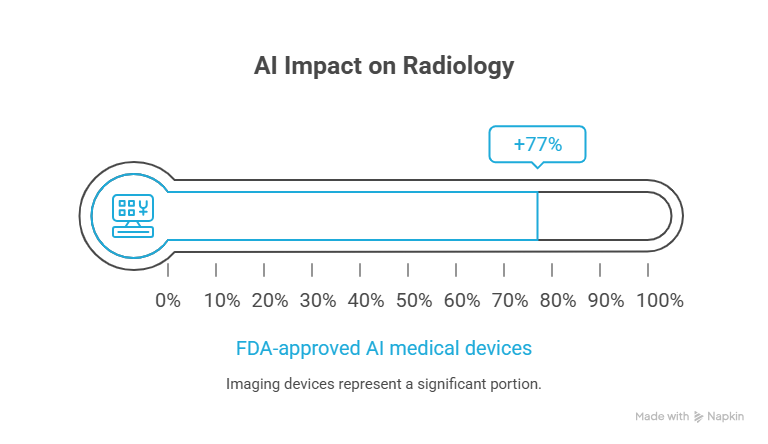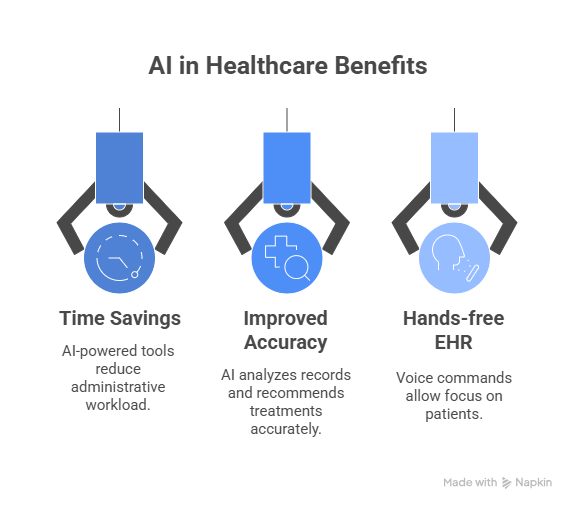Remember when healthcare breakthroughs took decades? Today, they’re happening every quarter.
Artificial Intelligence (AI) isn’t just a trend reshaping the healthcare industry; it’s a fundamental reprogramming of how medicine thinks, learns, and heals.
And the numbers tell a story too powerful to ignore:
The global AI in healthcare market is projected to reach $504.17 billion by 2032, growing at an astounding 44% CAGR.
This isn’t the future. It’s already here, and it’s rewriting the rules of diagnosis, treatment, and prevention.
The Shift: From Reactive to Predictive Care
For centuries, medicine waited for symptoms.
Now, AI sees them coming.
AI-driven predictive analytics can identify disease risks before they appear. By analyzing millions of data points, from genetic codes to smartwatch readings. It's helping doctors act preventively, not reactively.
Imagine your doctor knowing you’re at risk for cardiac distress weeks before your heart does.
That’s not science fiction. It’s predictive medicine, already in motion.
The New Face of Diagnosis: When Machines See What We Miss

Radiology has become AI’s first major triumph.
Over 77% of FDA-approved AI medical devices are built for imaging and for good reason.
AI systems are matching and often surpassing human accuracy in detecting conditions like cancer, fractures, and neurological disorders.
Beyond accuracy, it’s also about efficiency.
AI enhances image quality, reduces radiation dose, and automates reporting simultaneously.
That’s precision and compassion at scale.
The Age of Personalization: One Patient, One Plan
Medicine used to treat symptoms.
AI treats individuals.
By merging genomics, lifestyle data, and patient history, AI in precision medicine can predict how a person will respond to a drug before they take it.
The result: truly personalized treatments, more effective therapies, fewer side effects, and faster recoveries.
As the cost of genome sequencing drops to $1,500, personalized healthcare is becoming the new standard.
“We’re entering an era where no two treatments will ever look the same again.”
Revolution in the Lab: How AI is Accelerating Drug Discovery
Bringing a new drug to market traditionally costs billions and takes over a decade.
AI is cutting that by up to 40% in time and 30% in cost.
AI platforms like AtomNet are identifying viable drug compounds across hundreds of targets. Discoveries that might’ve taken years are now made in weeks.
By 2025, experts predict 30% of all new drugs will be discovered using AI.
That’s not just innovation. That's an acceleration humanity has never seen before.
Health on Your Wrist: AI and Wearables Creating Always-On Care
From the Oura Ring to WHOOP Coach, AI-powered wearables are transforming personal health.
They monitor not just your heart rate, but also stress, sleep cycles, and recovery patterns, building a live model of your well-being.
With generative AI, platforms like WHOOP Coach analyze biometric data and deliver personalized health recommendations, like having a personal health scientist on your wrist.
This is what healthcare looks like when it follows you, not the other way around.
Behind the Scenes: AI Eases the Weight on Doctors

One of AI’s most profound impacts is invisible.
It’s giving doctors their time back.
AI-powered documentation tools now listen to patient-doctor conversations and automatically generate clinical notes.
Leading hospitals report up to 90% adoption rates, cutting administrative workload dramatically.
Meanwhile, AI in Electronic Health Records (EHRs) analyzes patient histories, detects risks, and recommends treatments with up to 98.7% diagnostic accuracy.
Next-generation EHRs even respond to voice commands, allowing physicians to focus on patients, not screens.
The Ethical Frontier: Balancing Power and Responsibility
The promise of AI also brings pressing ethical and legal questions:
- How do we protect patient privacy when algorithms rely on massive datasets?
- Who’s accountable when AI makes an error?
- How do we prevent algorithmic bias from widening healthcare disparities?
The solution lies in collaboration between human empathy and machine precision.
AI won’t replace doctors. It will redefine how they work together.
What 2030 Looks Like: The Living Intelligence Era
By 2030, healthcare will evolve into a living, intelligent ecosystem.
- Generative biology will design new proteins and genes for targeted therapies.
- Multimodal AI will integrate imaging, genomics, and behavioral data into one unified health model.
- Living intelligence will be embedded into devices, homes, and cities to enable continuous health monitoring.
The hospital of the future won’t just treat the sick.
It will prevent illness before it begins.
Why the Future of Healthcare Is More Human Than Ever
AI isn’t taking over healthcare.
It’s humanizing it.
It helps doctors see more, sooner, and smarter.
It gives patients a voice, a choice, and continuous care.
It turns healthcare from reactive chaos into proactive compassion.
The question isn’t if AI will redefine healthcare.
It’s who will be ready when it does.
Final Takeaway
The AI revolution in healthcare isn’t just about smarter machines; it’s about empowering people. At Linkenite, we believe real progress happens where human empathy meets intelligent automation.
Check out our latest carousel to see how this human and technology partnership is redefining industries like healthcare, where innovation enhances care, not replaces it.

.png)







.png)
.png)
.png)
.png)
.png)
.png)
.png)
.png)
.png)
.png)
.png)
.png)

.png)
.png)
.png)
.png)





.png)
.png)

.png)









.jpg)

.jpg)
.jpg)


.png)









.png)

.png)
.png)
.png)






.png)
%20(2).png)
.png)
.png)





.png)

.png)


.png)


.png)




.png)



%20BLOG%20BANNER.png)




.png)